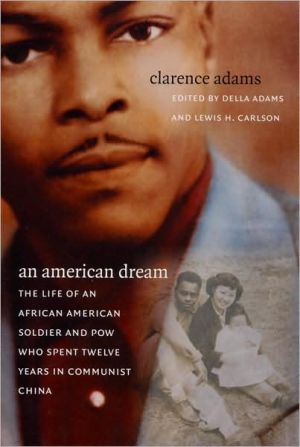

 |

|

The average rating for An American Dream: The Life of an African American Soldier and POW Who Spent Twelve Years in Communist China based on 2 reviews is 4.5 stars.
Review # 1 was written on 2019-10-14 00:00:00 Jose Gonzalez Jose GonzalezIt is a very precious book telling what happened during Korean war from perspective of a black soldier. It gave insight of racial separation in the south before he was enlisted as a machine gunner. The racism he was facing in the military, during the combat, subjecting captured, in POW. Adams gave strong reason why he chose China and why he made the "infamous" broadcasting to black solders who is fighting for Vietnam war. There are tender moments in meeting his wife Lin, his last days with his daughter Della. Clarence Adams is a people's person, his friends, colleagues, fellow students in China can testify. The book also put historical propaganda into question from both side. Only people like Adams lived on both sides. Adams had dear memory of people he encountered in China, a farmer nearby bring an egg fresh laid to his new born daughter, a fisherman bring fish. The villagers nearby talked about how will a baby of a black dad and Chinese mom will turn out: checker, front black back white or zebra; every relieved when Della was born a beautiful light skin girl. The ending life of Adams wasn't regretful his life choices, but sorry for not providing his beloved wife a good life. He worked at his Chop Suey restaurant until his last days. When he was in the POW, he asked the Chinese to provide them material too cook American food; when he was in Beijing working for foreign press, he cooked soul food for African diplomats; when he came back to US, he cooked Chinese food, or a black version Chinese food for rest of his life. |
Review # 2 was written on 2020-10-03 00:00:00 Jean-olivier Marand Jean-olivier MarandClarence Adams enlisted in the army so as to not be hurt/arrested in a racist attack against him in the American south. Little did he know that he'd be whisked off across the world to fight in the Korean War, and then proceed to be captured as a prisoner of war. Following the war's conclusion, Adams was given the opportunity to repatriate, and to return home to the United States. Yet, he was not required to do so, and as a result, he, along with 21 American soldiers, resettled in China. He married a Chinese woman, had children, and lived a rather happy, peaceful life in China. Then he finally came home, only for HUAC in Congress to subpoena him and question his loyalty. Adams ends his memoir with a particularly powerful few lines: I was determined to be my own person and control my own destiny, and no one else was going to define who I was or tell me what I was supposed to do. When you think about it, isn’t this what America is supposed to be all about? He echoes a similar sentiment interwoven throughout his time fighting in the Korean War and then being held as a POW at Camp 5; on the battlefield, he was a pawn for American governmental interests. He recalled, rather poignantly, the white soldiers who left a black soldier defenseless, at the mercy of the North Korean army, in one particular battle -- and he relays this to the members of the HUAC when he is called in for questioning. Even on the battlefield inequality was ubiquitous, inescapable. So why should he return home, only to met with trials for being a "Commie" or Communist sympathizer/traitor, in addition to facing American racism back home, rather than abroad? Adams, when questioned, continuously reiterates the point that as part of his repatriation agreement/accord, he could choose to go to any country of his choosing to "honor [his] request for freedom, equality, education, and happiness" (126). China seemed to offer a new chance at life (however hyperbolic that might sound) than what Memphis, his birthplace, could offer; so why not take it? Adams found himself an adherent of a "religion," a religious ideology -- albeit not necessarily on his own accord, for he was somewhat indoctrinated as a POW, and then benefited greatly from the Chinese Communist system -- for the American "religion" could not suit him; living in China offered the prospect of "freedom, equality, education, and happiness." And that, he found -- he was educated, had greater freedom -- and while it was certainly not ideal, China offered greater prospects than going back home. Was he not just after a more fulfilling life? Who are we to judge for making that decision? This memoir was immensely fascinating, although I didn't totally vibe with the writing style; it felt too flat and direct, perhaps even too straightforward, for its purposes. However, I still very much enjoyed pondering the ethical quandaries of Adams' decision, and seeing another side of the Korean War, one that is not often discussed in a history class! |
CAN'T FIND WHAT YOU'RE LOOKING FOR? CLICK HERE!!!